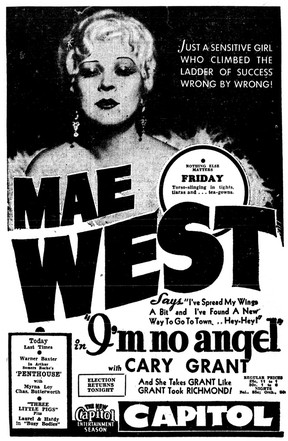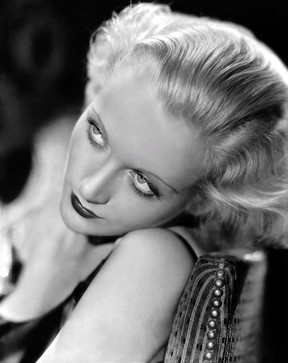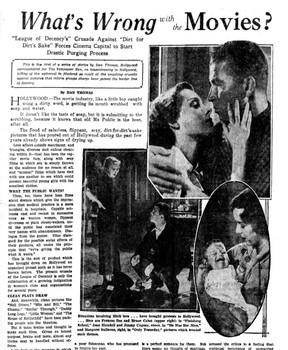The censorship document imposed a moral code on American movies during the 1960s.

.
In July 1934, Hollywood bowed to public pressure and announced that it would censor itself with the Hays Code.
Announcement 2
.
Religious and conservative groups had long protested that Hollywood movies had been playing up sex and violence to win a larger audience. The Hays Code had been devised in 1930 to smooth things over, but it wasn’t enforced for four years, until the clamor for some form of censorship became too loud for Hollywood to ignore.
The code is named after Will H. Hays, who was president of the Motion Picture Producers and Distributors of America. But the real censor was Joseph Breen, who watched movies and then made suggestions to cut or rewrite offending bits.
The preamble to the code stated: “No image shall be produced that lowers the moral standards of those who view it. Therefore, the sympathy of the audience will never lean towards the side of crime, wickedness, evil or sin.”
Announcement 3
.
Syndicated columnist Dan Thomas agreed with the censors. On July 28, 1934, The Vancouver Sun published the first installment of a six-part series by Thomas entitled “What’s Wrong with the Movies?”
“The movie industry, like a little kid caught using a swear word, is washing its mouth out with soap and water,” Thomas began. “He doesn’t like the taste of soap, but he’s putting himself through the scrubbing, because he knows old Ma Public is the boss, after all.
“The avalanche of lewd, frivolous, sexy and dirty images that has come out of Hollywood in recent years shows signs of wearing thin.”
The crusade to clean up Hollywood had been led by a group called the League of Decency. He approved of “clean pictures” but criticized the stories of others.
Announcement 4
.
“Out-of-wedlock love affairs and triangles, divorces, and insensitive cheating within (marriage) have been standard movie fare, along with sexy movies where sex is just thrown in for no reason, and movies ‘ musicals’ who have competed against each other to see which could feature the beautiful young women in the lightest clothing,” Thomas wrote.
“There have also been movies about doctors that give the impression that medical practice is a mere accident in hospitals. Capable actresses play and recast successive roles as lascivious women, frivolous divorcees, or simple prostitutes, until the public has associated their names with abandonment.
“Dialogue from the gutter. Total disregard for the possible social effects of their products, all under the principle, ‘We are giving the public what they want’”.
ad 5
.

Thomas continues to give names. James Cagney and Joan Blondell were slated for the film He Was Her Man, “in which Joan plays a prostitute who spends the night with Cagney before going to another city to marry Victor Jory, a poor fisherman who has promised to forgive her. his past. ”
Margaret Sullavan launched her career with the successful 1933 film Only Yesterday. But Thomas disapproved of the plot, where Sullavan falls in love with a soldier. “They love too passionately”, he is sent to World War I, and she gives birth to her child out of wedlock.
The second installment of Thomas’s personal moral crusade was about actresses “always played in demeaning roles.”
“Mae West, Norma Shearer, Jean Harlow, Constance Bennett and Carole Lombard are finding the cards pretty stacked against them as a result of the characters they’ve played over the last few years,” Thomas wrote.
ad 6
.
West’s stardom was affected by the Hays code: his biggest movies preceded it. A 1934 West film shot as It Ain’t No Sin was changed to St. Louis Woman and later retitled Belle of the Nineties. But it wasn’t a hit like his raunchy 1933 movies I’m No Angel and She Done Him Wrong.
The Hays Code remained in effect for decades, even after the US Supreme Court ruled that it violated the right to free speech in 1952. But times changed, and it was finally struck down in 1968.
Still, there were plenty of films that got around censorship with imaginative scripts or cinematography.
“(The Code) had a very good effect because it made us think,” said director edward dmytryk.
“If we wanted to broadcast something that was objectionable… we had to do it in a roundabout way. We had to be smart. And it generally turned out to be much better than if we had done it directly.”



